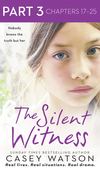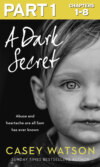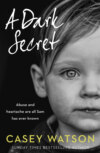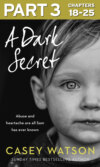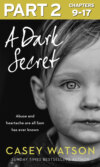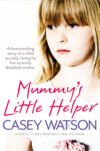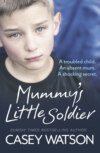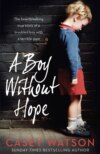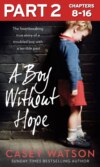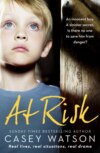Czytaj książkę: «The Silent Witness: Part 3 of 3»

Copyright
This book is a work of non-fiction based on the author’s experiences. In order to protect privacy, names, identifying characteristics, dialogue and details have been changed or reconstructed.

HarperElement
An imprint of HarperCollinsPublishers
1 London Bridge Street
London SE1 9GF
First published by HarperElement 2017
FIRST EDITION
© Casey Watson 2017
A catalogue record of this book is available from the British Library
Cover image © Tanya Gramatikova/Arcangel Images (posed by model)
Cover layout © HarperCollinsPublishers 2017
Casey Watson asserts the moral right to be identified as the author of this work
All rights reserved under International and Pan-American Copyright Conventions. By payment of the required fees, you have been granted the nonexclusive, non-transferable right to access and read the text of this e-book on screen. No part of this text may be reproduced, transmitted, downloaded, decompiled, reverse engineered, or stored in or introduced into any information storage retrieval system, in any form or by any means, whether electronic or mechanical, now known or hereinafter invented, without the express written permission of HarperCollins e-books.
Find out about HarperCollins and the environment at
Source ISBN: 9780008142643
Ebook Edition © June 2017 ISBN: 9780008142698
Version: 2017-04-21
Contents
Cover
Title Page
Copyright
Chapter 17
Chapter 18
Chapter 19
Chapter 20
Chapter 21
Chapter 22
Chapter 23
Chapter 24
Chapter 25
Epilogue
Topics for Reading Group Discussion
Casey Watson
Moving Memoirs eNewsletter
About the Publisher
Chapter 17
I felt tense over the next couple of days – as if I were living on borrowed time. And it wasn’t the first time I’d felt that way, which only made it worse. Nothing like being the master of your own potential downfall to concentrate the mind.
Nevertheless, even though I initially thought ‘What the hell have I just done?’, as anyone sensible would, I soon dismissed the notion. I had only done what I’d needed to do.
Both in my work as a foster carer and previously when I’d worked in schools, I had sailed a little too close to the wind on a couple of occasions, and it was always for the same (and, to my mind, rational) reason. Because I was convinced I was doing the right thing.
Not that sailing that close to the wind was an easy manoeuvre, as any salty seadog would tell you. There was always a trade-off – do the right thing and risk jeopardising your job, or take the safe route on the job front and accept that you might spend the rest of your life regretting it.
Which probably sounds a bit dramatic, but that’s always the dilemma, and it’s my blessing and curse that when I decide something I stick to it. And even if it does make me question whether it’s worth losing my job, on every similar occasion I’m afraid the answer is yes.
In any event, I only had myself to blame if the powers that be didn’t see the situation in the same way as I did, because, even as I tore it up, I knew that, whatever happened as a consequence – even if it turned out to be nothing – I would at some point have to admit to what I had done. I’m not a dishonest person and I would have to open up at some point and face the consequences, or I knew it would continue to eat away at me.
As it stood right now, however, I was barely conscious of it even nibbling. No, in pride of place on my post-letter-ripping-up mental to-do list was that I had given myself time; time in which I had to get Bella to talk. Or my rash, impulsive act would have been in vain.
In that sense, my push to get Bella back into school was a double-edged sword. On the one hand, going to school might prove a positive catalyst, in that, back among peers, Bella might better visualise her future, but, on the other hand, it meant less time spent with me.
On the whole, though, I was cheerful when the call came from ELAC first thing on the Thursday – not least because Bella being safely in school meant that, should something further happen with Adam Cummings’s spurious sister, chances were she wouldn’t even be around.
‘And it sounds as though there is plenty of scope for her to have some TA support,’ added the ELAC man, who was called Howard, and sounded very posh. ‘At least to take us to the Easter holidays, by which time she will have hopefully settled in. My colleague tells me she’s a bright girl?’
‘Definitely,’ I confirmed.
‘Excellent. That should make a world of difference. Hopefully her recent traumas won’t have set her back too far, but you know as well as I do how often children struggling with their home lives tend to switch off educationally as well. So that’s good news.’
‘It is indeed,’ I said. I knew all too well, from my experiences as a behaviour manager in that same school, how quickly children with emotional and behavioural problems could flounder, and if that went hand in hand – as it often did – with them struggling with their school work, it soon became a doubly destructive spiral; if you couldn’t keep up, you tended to withdraw, which made it harder to contribute to lessons, which meant you fell further behind, which meant you withdrew even more, fearful of the shame and wrath of bullies.
Hopefully, not so Bella, whom Howard told me he’d be coming to visit at home the following Monday, so he could assess where she was academically.
‘How about learning support?’ I said, thinking of my old friend and Special Needs Co-ordinator there, Julia Styles. Though I didn’t think Bella would struggle academically, she would continue to be vulnerable emotionally until there was some degree of certainty in her life – be it that she’d remain in care while her mother spent some time at Her Majesty’s pleasure or, by some miracle, the process to reunite mother and daughter was begun.
‘Again,’ Howard explained, ‘that will depend on how she does on her assessment. But we can discuss all that when I come out, of course. And am I right in thinking you have connections at the school yourself anyway?’
I told him I did, and that it made me sound like some sort of educational gangster, hustling for favours. And he laughed. I put the phone down feeling altogether more positive – and that, if my connections came good, and Bella thrived in my old comp, my little crime would be even more able to be justified.
Bella, too, seemed very pleased with the situation, even going so far, when she appeared downstairs, having had her shower and hair wash, to do a little Tyler fist pump at the news, followed by her telling me she was ‘well’ happy – another Tylerism.
‘I’m happy too,’ I said. ‘I think being back in school will be good for you. And something to tell Mum about when you see her, eh?’
Which was happening today, hence the hair wash, and my promise to style it for her, and I couldn’t help noticing how, one way or another, an element of hope had crept into her manner. I didn’t know quite what she’d been reading in the library, only that whatever it was, she seemed to have a new handle on the situation. I just hoped that hope wasn’t about to be dashed.
She nodded happily, and I thought, as I often found myself doing, about the remarkable adaptability of children. Here she was, in appalling straits, the like of which you wouldn’t wish on anyone, let alone a twelve-year-old, yet there were moments, such as this one, when her stoicism astounded me. When the light of hope was sufficient – at least that’s how it looked – to banish the demons into exile.
‘So we’ll be needing some uniform,’ I said. ‘Perhaps we’ll all of us take a trip into town tomorrow to get you some. Right now, though, we’d better get the hair salon open for business, so you can look your very best for your visit to Mum, eh?’
‘And let’s hope it’s for the last time,’ she said. ‘Oh, I so hope this’ll soon be over and she can come home. Oh, and we mustn’t forget to take the picture of the sunflowers for her,’ she added. ‘Well, the place in the ground where they are underneath anyway. Wouldn’t it be amazing if she’s home before they’ve grown?’
I should have known not to get my own hopes up, of course. But amid the flurry of getting ready, of Sophie’s arrival, of taking the photo of the patch of neatly tilled earth with the little wooden sticks in, under which those sunflower seeds nestled – oh, and of course printing it out for her – I obviously forgot to pop my realistic head back on. But as soon as I saw Sophie’s car pull up again five hours later – in what felt like a moment of déjà vu – it landed with a resounding whump on my shoulders.
The grandchildren had just finished their tea when they arrived – Tyler holding court at the head of the table, and, seeing Bella and Sophie climbing back out of the car, his, ‘Uh-oh. Doesn’t look like it went well, Mum,’ took the words right out of my own mouth.
We exchanged mutual frowns. ‘D’you want to take the little ones out into the garden for a play?’ I asked him. He nodded sagely. He didn’t need telling twice.
I went to the front door to greet them, fearing the worst. And also getting it, seeing Bella’s pale face and Sophie’s glum expression.
‘I won’t hang around,’ the latter said, her hand on Bella’s shoulder. ‘I’ve got a meeting I mustn’t miss and the traffic’s pretty hellish. Anyway, see you soon, sweetheart,’ she added, giving Bella a quick hug. ‘Chin up, okay?’
We’d have a chance for a proper debrief later – I knew Sophie would send me an email – so I told her to get her skates on and waved her back to her car.
‘So,’ I said, turning to Bella, who’d stood on the doorstep to wave with me. ‘Feeling a bit low? Come on. Let’s get you a cuppa, eh? And you can tell me all about it. Tea’ll keep till you’ve had a chance to get it off your chest.’
I half expected her to tell me she just wanted to go up to her room and be on her own for a bit, but was relieved when she nodded her agreement and followed me into the kitchen. And yet again, I felt a small jab of justification. She clearly wanted to talk. Clearly did need to get it off her chest. Had she been taken away, that reassuring sense of familiarity would be gone.
‘I can’t imagine how hard it must be for you,’ I said, sitting down at the kitchen table with her. ‘Seeing your mum in that place. Having to talk to her with all those people around, listening in to your conversation. But at least you’ve seen her. And at least she’s seen you, for that matter. That will have helped her a lot, believe me – just seeing your lovely face, being able to hold your hands, knowing you’re okay.’
She nodded glumly, then buried her face in her mug and sipped her tea.
‘So,’ I went on. ‘Did you tell her all about the sunflowers you’re growing? Show her the picture? Well, such as it is! But you know what, I’ll bet you with all this sunshine we’ve been having that you’ll have something to show for it, and to tell her about, in a matter of days. Pound to a penny those seedlings will have popped up by tomorrow.’
She nodded again, her eyes beginning to fill with unshed tears. ‘But I want her to come home,’ she said eventually. Plaintively. ‘I just want her to be let out of that horrible place, and come home.’
I stopped myself from uttering my knee-jerk response of ‘and she will’. Because I didn’t know that. Didn’t even believe that, to be honest. Not in the short term, at any rate. How on earth was that going to happen? She’d be released, if she was going to be, once the law had run its course. And the law, of necessity, moved very slowly. And it struck me that, perhaps for the first time, neither did she believe it, either. I wondered what had passed between them, but I knew I mustn’t ask.
‘I know, love,’ I said. ‘I know how hard this must all be for you. How much it must hurt to see Mum in that place.’
She didn’t say anything for a moment, just put the mug down on the kitchen table and turned it around between her hands. ‘I just don’t know what to do,’ she said.
‘Do?’
‘Do to help her.’
She fell silent again. I put down my own mug. Perhaps I should seize the moment. ‘You know,’ I said, ‘the brain’s a funny thing, Bella. And clever, too. Sometimes our brains are cleverer than we realise. Sometimes, when something bad happens – something we’ve seen but wish we could un-see – well, the brain has this way of protecting us. You know, shutting us off from remembering things that are too painful to remember. So the remembering of them can’t hurt us even more than they’ve already hurt us, you know?’
She nodded, but her eyes were downcast, as if she didn’t want to look at me.
‘But as time passes,’ I went on, ‘sometimes it lets glimpses of things in through the fuzzy bits. Just little glimpses of the bigger picture. And that’s hard too, because you’re not sure you can make sense of what you’re remembering, and then you’re scared, because you’re not sure you can believe what you saw …’
Bella lifted her eyes to mine, but as our gazes met she immediately lowered them.
‘Because sometimes we don’t want to believe what we saw. Sometimes we wish so hard for what we saw happen not to have happened … because it doesn’t quite fit with everything else we know … doesn’t fit with the bigger picture. You know, in your case, how your mum is, and how your dad is …’
Her eyes met mine again. ‘He’s my stepdad.’
‘Your stepdad,’ I quickly acknowledged. I reached out to touch her hand. ‘I understand, you know,’ I said quietly. ‘I know how hard it is to tell the truth sometimes, Bella. Because though it’s what happened, it’s still at odds with the truth – the bigger truth – that you know.’
A single tear tracked down her cheek and disappeared under her chin. ‘Sweetheart, you’re in such a horrible situation. Only you know what happened that day. Just your mum, and your stepdad – and you. But, you know, however much you think it’ll make everything worse for your mum if you say what happened, if it has come back to you – even if it’s just bits of it – it might help a lot if you feel brave enough to tell someone. It might help your mum. I know I can’t promise that, but from what I do know, I think it might. Because right now,’ I ploughed on – in for a penny, in for a pound … ‘With your mum saying one thing and your stepdad saying another, the people who have to make all these huge, difficult decisions don’t know who to believe, do they? Which is why they end up having to ask other people – friends of your mum and your dad – neighbours, whoever – what they think. And whatever you saw, however much you worry that it might be bad for your mum, it won’t make it worse than it is all the while they don’t know, will it?’
I could have said more. So much more. But how could I begin to even hint at what I knew about the case being made against Bella’s mother? For one thing, I still felt it was a confection, at least in part. And even if there were elements of truth buried in the vitriol, what Bella had already told me put that in a very different perspective. Her mother may be no saint, but she had also been sorely tested. And if Bella didn’t paint that bigger picture, who would?
And for another thing, it was absolutely not my place to lead or coerce her into saying anything. In that sense, I had already overstepped the mark.
I sat back. ‘You must be exhausted, sweetheart,’ I said more briskly. ‘And hungry? How about some food?’
She shook her head.
‘Well, perhaps you’re in need of a lie-down before anything else,’ I said. ‘Maybe get into your jim jams, yes? Let the dust settle. No more chat from me for the moment. Come on, how about I run you a nice bath and we –’
‘I want to,’ she said, surprising me. ‘I really, really want to tell the truth, Casey. They think I don’t but I do. So badly. I hate that they’re asking everyone else. What do they know about it? I told Sophie that.’ She went silent again.
I held my hand out. She took it. ‘I just can’t.’
Because all the kids were around, and I had no right or wish to banish them (or, indeed, scuttle off and go into a marital huddle), I had to hold off the summit talk and debrief I really wanted to have with Mike. Instead, once the little ones were in bed, I sat in front of the TV (Bella having decided on an early night in the company of her favourite wizard) where all I could do was sit and half-watch the television while having the conversation with myself.
How bad had it been? That was what I kept coming back to. How bad could it have been that she dare not – would not – voice it? Despite all of my years studying children, of reading up on behavioural therapy and psychology, and working with troubled kids, I had absolutely no clue how I was going to help unlock the secrets this child was keeping. And until someone did, be it me, or her counsellor, or Sophie, or anyone, we were all floundering about in the dark.
And for the first time I had to seriously entertain the thought that maybe her stepdad was the one telling the truth. That, contrary to everything I believed, he had done nothing to provoke the attack by his wife. That his story – of drinking heavily, falling asleep, of waking up to find himself being violently attacked by his partner – was the truth.
Was Bella just doing exactly what her mum had told her to? Pretending to have seen nothing because that same mother had told her that if she told the truth she wouldn’t even have a mother, not physically, at any rate, and potentially for years and years.
I didn’t need Mike to speak to hear his voice in my ears. Perhaps that was the truth of it, and it was giving me one hell of a headache.
Mike and I were still sitting in front of the telly, Tyler playing a game on the laptop, when Bella reappeared. Woken from a doze, I looked at the clock, and was surprised. After our conversation I’d made a point of going up and checking on her an hour earlier (and the little ones, who’d taken over Ty’s room – he was stoically camped out in the conservatory for a few days), and at that time she’d apparently been sound asleep. But something had now woken her. Upset her. Perhaps a nightmare. Hardly surprising, given the sights, sounds and emotions her memory bank was probably now filled with.
Seeing Tyler acknowledge her, I turned around to see her standing there in her dressing gown, her faithful Dobby hanging down from her hand at her side. I could tell from her puffy eyelids that she’d been crying.
She didn’t speak, but it was obvious she needed me to go to her, so I got up immediately and herded her across the hall and back into the kitchen, where I sat her down once again, on one of the kitchen chairs.
I then plucked some kitchen roll from the holder, pulled out another chair and sat across from her, so our knees were almost touching. I handed her the kitchen roll, which she put in her lap along with Dobby. Now I’d sat her down, I realised she was, in fact, dry-eyed. That whatever crying she’d been doing was now over.
‘What’s up, love?’ I asked her. ‘You getting stressed about what we talked about earlier? Or is it school? Have you got the jitters now? Because, you know, it’s –’
‘No, it’s not that,’ she said, folding the kitchen roll into squares. ‘It’s just that I’ve been going over and over things …’
‘Things with Mum?’ I asked gently.
She nodded. ‘Casey, can I ask you something?’ she said.
‘Course you can. Anything. You know that, love.’ I waited.
‘It’s just that … what d’you think is worse? Is it worse to break a promise or is it worse to tell a lie?’
Philosophy, then, no doubt related to our chat earlier on. ‘Can’t,’ she’d said. Can’t tell the truth. I re-ran the question in my head, putting it in context. A promise or a lie? I felt a prickle at the back of my neck. Was this going where I thought (and hoped) this might be going? ‘Hmm. That’s a tricky one,’ I said.
‘It’s not a trick question, honest.’
‘No, I know that, love,’ I said, reaching out to squeeze her arm. ‘It’s just a hard one so I’m going to need time to think about it. Hmm …. I suppose it depends. On what the promise is you might be breaking. And on what the lie is.’ I leaned closer. ‘Can you give me a little more to go on?’
Clearly not. Her response was a small but unmistakable shake of her head.
‘Ok-ayyy …’ I said. ‘Fair enough. But, well, in that case I can only answer you hypothetically. You know that word?’ Bella nodded. I bet she probably did, too. ‘And I think you’d have to ask yourself what the consequences might be – you know, of breaking the promise as opposed to telling the lie. And who you made the promise to, of course. I suppose that’s the main thing, isn’t it?’ I went on, beginning to settle into my thinking, but still conscious of my responsibility not to lead her. ‘That and how big a thing the promise is. You know, sometimes we’re asked to make a promise to someone and, because it’s someone we care about, we immediately say yes, don’t we?’
I paused for a response, and was rewarded with a small movement of the head. ‘And, sometimes, we make that promise without really thinking what it might mean for us. Us or them. And that’s because sometimes we don’t know what the consequences might be. We don’t have crystal balls, do we? So it’s not clear-cut. If you make a promise and then realise you shouldn’t have, for either your or the person you made the promise to’s sake, then sometimes you have no choice but to break the promise. And, when it comes to a lie …’ I paused again. She was looking at me so intently, I felt I had to think about every word. ‘Well, we’ve already talked about white lies, haven’t we? Remember? When we were talking about Facebook the other week? Almost all of the time, though, telling the truth is the only right way to proceed, and that’s not just because you should tell the truth, because it’s the right thing to do – it’s almost as important because when we tell a lie it lives on inside us, doesn’t it?’
I touched my chest, remembering that letter I’d binned, and thinking, Ain’t that the truth? But was my doing so about to be vindicated? The fact that she was still here, sitting opposite me, asking me questions of moral philosophy. Would this be happening if she’d been taken from us and was now in another stranger’s home?
Since she was showing no signs of doing anything other than listen, I ploughed on. ‘That’s the thing about lies. They’re a bit like rust on a new car – eventually, just like rust, lies begin to corrode you. Because telling one lie so often means you have to tell more lies. So, on balance, I’d say, with very few exceptions, that it’s always the better choice to tell the truth.’
I sat back a little. Bella did as well. And then spent a few moments seemingly in silent communion with Dobby, the kitchen roll now a small piece of origami in her lap. Then she looked at me again. ‘Yes, but which is worse?’
Ah. A good point, I hadn’t actually answered that one, had I? I leaned forward again. ‘Sweetheart, that’s just so hard for me to say without knowing what the promise was. What the lie was. How big they both were.’
Darmowy fragment się skończył.
